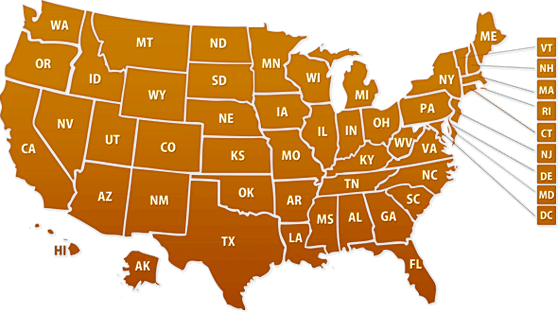Click on the map to begin your search

Foreclosure Laws

If you want to invest in foreclosures, understanding foreclosure laws is vital. Understanding foreclosure laws can help you avoid common investment mistakes and can help protect you legally. The challenge is that laws for foreclosure process vary by state, so you will need to learn the laws for every state where you hope to invest.
There is one main difference in foreclosure processes between states: some states use non-judicial foreclosure processes and some use judicial foreclosure processes. Most states that use mortgages for the purchase of real property have a judicial foreclosure process, which means that the court system is involved in foreclosing homes. Most states that use deeds of trust for the purchase of real property use a non-judicial foreclosure system, which means that the court system is not involved in the foreclosure procedure.
The judicial foreclosure procedure
In most states that have a judicial foreclosure procedure, lenders must prove in court that a borrower's mortgage is in default. This usually involves launching a lawsuit against the borrower to determine how much is owed and to prove that the lender has the right to sell the home as collateral to use the money to pay off the bad loan. The court essentially grants the approval to start foreclosure proceedings. In this type of foreclosure proceeding, the suit generally begins when the lender files a lis pendens, which is a notice declaring that a lawsuit is pending.
The non-judicial foreclosure process
In states that have a non-judicial foreclosure process, most deeds of trust that are used to purchase real estate have a power-of-sale clause. This clause allows the lender to start foreclosure against a borrower who is behind on his or her mortgage payments. The clause allows the lender to seek foreclosure without going to court. Usually, most states with non-judicial foreclosure processes require lenders to file a notice of default, which is a public notice declaring intention to repossess a home. The lenders are also usually required to keep the borrower or homeowner appraised about the status of the foreclosure and the homeowner is required to keep the lender appraised of the loan status. If the lender and the borrower cannot reach an agreement or a resolution about the defaulted loan, the lender can then follow the state's rules to sell the home and use the money to pay off the debt.
| State | Judicial | Non-Judicial |
|---|---|---|
| Alabama | • | • |
| Alaska | • | |
| Arizona | • | • |
| Arkansas | • | |
| California | • | |
| Colorado | • | |
| Connecticut | • | |
| Delaware | • | |
| Washington DC | • | |
| Florida | • | |
| Georgia | • | |
| Hawaii | • | |
| Idaho | • | |
| Illinois | • | |
| Indiana | • | |
| Iowa | • | |
| Kansas | • | |
| Kentucky | • | |
| Louisiana | • | |
| Maine | • | |
| Maryland | • | • |
| Massachusetts | • | |
| Michigan | • | • |
| Minnesota | • | |
| Mississippi | • | |
| Missouri | • |
| State | Judicial | Non-Judicial |
|---|---|---|
| Montana | • | |
| Nebraska | • | |
| Nevada | • | |
| New Hampshire | • | |
| New Jersey | • | |
| New Mexico | • | |
| New York | • | |
| North Carolina | • | |
| North Dakota | • | |
| Ohio | • | |
| Oklahoma | • | |
| Oregon | • | |
| Pennsylvania | • | |
| Rhode Island | • | |
| South Carolina | • | |
| South Dakota | • | • |
| Tennessee | • | |
| Texas | • | |
| Utah | • | |
| Vermont | • | |
| Virginia | • | |
| Washington | • | • |
| West Virginia | • | |
| Wisconsin | • | |
| Wyoming | • |
Search Foreclosures by Top Cities:
- Atlanta Foreclosures
- Boston Foreclosures
- Chicago Foreclosures
- Dallas Foreclosures
- Detroit Foreclosures
- Houston Foreclosures
- Indianapolis Foreclosures
- Los Angeles Foreclosures
- Miami Foreclosures
- Philadelphia Foreclosures
- Phoenix Foreclosures
- San Antonio Foreclosures

